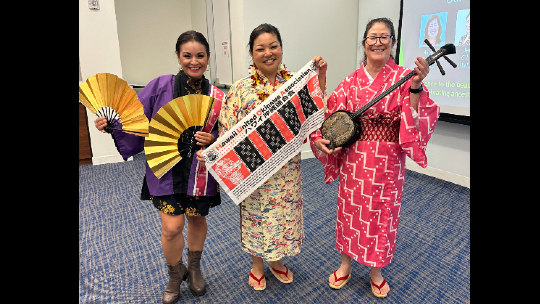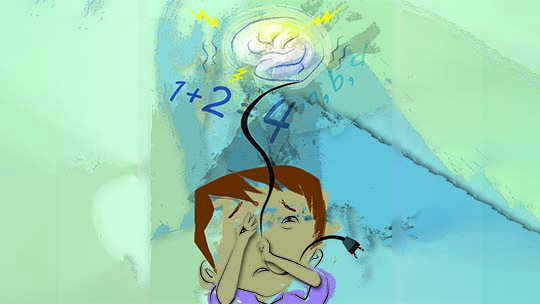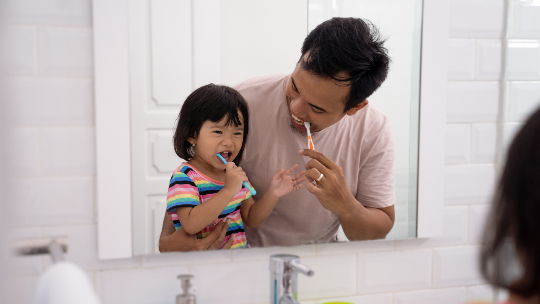Far removed from the Mainland sits a chain of islands with its own distinct culture, natural beauty, and residents who embody island pride. Though this sounds like Hawaii, it also describes Okinawa.
The southernmost prefecture of Japan is also referred to as the Land of Immortals due to the longevity of its residents. Okinawans have less cancer, heart disease, and dementia than Americans. We talked to Uchinanchu (person of Okinawan descent) and goodwill ambassador, Courtney Takara, about Okinawa and how you can celebrate its culture, too.
From generation to generation
Takara has been immersed in Okinawan culture from a young age thanks to her maternal grandmother. “She was active in her club, Nakagusuku Sonjin Kai, and made it a point to bring the entire family to the Okinawan Festival to volunteer and attend each year,” Takara says. “One year when I was about 8 years old, I saw koto players performing on stage. And I told my mom I wanted to learn how to play!”
Fortunately, through her volunteer work at the Hawaii Okinawa Center, Takara’s grandmother knew a koto sensei. “I took lessons from when I was 8 until I was 12 or 13,” she says. “I took a long break when life got busy. But I kept in touch with my sensei and she said I could return any time. So, I’m happy to say I finally restarted lessons in 2015.”
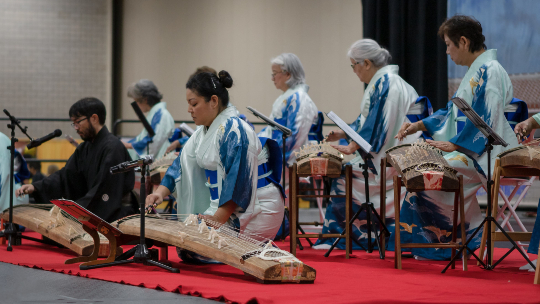
Courtney Takara (front row) playing koto with Ryukyu Sokyoku Koyo Kai Hawaii Shibu at the 2022 Okinawan Festival. Photo credit: Brandon Miyagi
A life-changing visit
In the fall of 2007, Takara visited Okinawa for the first time through the Hawaii United Okinawa Association (HUOA) Leadership Tour. The purpose of the tour is to give participants a chance to spend time in Okinawa then return to Hawaii and become more involved with HUOA. “It was awesome!” Takara says. “From the first day, I felt like I was at home.” She fell in love with the people, the food, and the lifestyle even more.
Takara remembers telling her parents that she didn’t want to come home. Her dad was shocked since he was born in Okinawa and lived there until his early teens. “He was prepared to hear me complain about the heat, the raw fish, since I wasn’t a big seafood eater at the time, and the laid-back vibe that was so different from the excitement of other places in Japan like Tokyo,” she says. “That trip set the stage for everything else in my life in terms of my involvement with HUOA and the relationships I built with folks in Okinawa.”
The Okinawan spirit
Takara appreciates the vibrance and vitality of Okinawa and its people. “Okinawans are so much fun and they know how to enjoy the best things in life,” she says. “And that sentiment applies to the Uchinanchu community here in Hawaii.”
To this day, she keeps in touch with the host family she stayed with 16 years ago and makes sure to visit them whenever she goes back. “They have a saying in Uchinaguchi, the Okinawan language, ‘Ichariba chode,’” Takara says. “It means ‘Once we meet, we are brothers and sisters.’” This welcoming attitude of love and acceptance is a hallmark of the Okinawan spirit.
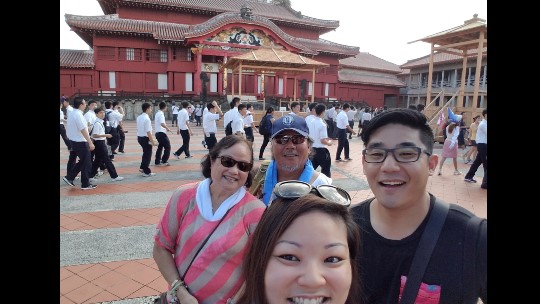
Takara with her family in front of Shuri Castle during their first trip to Okinawa in 2016.
A special way of life
One of the reasons Okinawans and Uchinanchu love and appreciate Hawaii is because of their similarities. Takara named a few:
- History. Both Hawaii and Okinawa were independent kingdoms. “The Ryukyu Kingdom and the Hawaiian Kingdom both had their own political influences, trade, monarchies, languages, and culture,” Takara says. “Eventually, when Okinawa and Hawaii became a part of Japan and the U.S., respectively, there was a loss of language, indigenous culture, and more. Both are still working to recover and rebuild their knowledge base.”
- Island lifestyle. Those born and raised in an island setting tend to have a different way of life. “Generally, it’s more relaxed, not as rushed, and there’s more appreciation of nature,” Takara says. “Island life also leads to stronger relationships with families and friends because people don’t necessarily move away, so you grow up in generational households and with friends that span lifetimes.”
- Moderate weather. Though Okinawa technically has a subtropical climate and gets colder and warmer than Hawaii, the weather is less extreme than mainland Japan. It’s no surprise that both places are popular visitor destinations. However, it’s not all sandy beaches and rainbows. “We both endure the heat and humidity and, of course, hurricanes or typhoons,” Takara says. “This understanding helps us appreciate every moment.”
A commitment to serving
Since 2008, Takara has served on the HUOA board of directors and executive council in various capacities. And though HUOA has a small paid staff, the leadership is entirely volunteer based. “It’s amazing working side-by-side with individuals from all walks of life,” she says. “Everyone is coming from a place of good intentions to help support the organization and its mission to promote, preserve, and perpetuate Okinawan culture in Hawaii.”
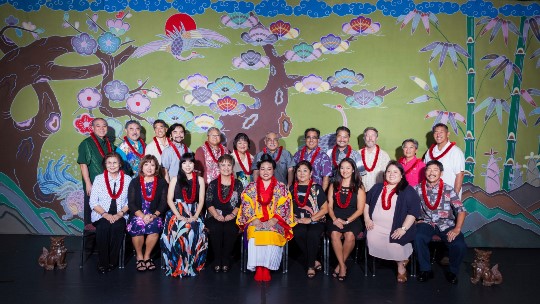
Courtney Takara (in yellow) was installed as president of HUOA in 2017 with the Executive Council. Photo credit: David Shimabukuro
One of Takara’s fondest memories is from 2017 when she was president-elect and chaired the Okinawan Festival the last year it was at Kapiolani Park. “It was absolute madness,” she says. “People came out in droves, especially since we had to cancel in 2016 due to safety concerns from the threat of a hurricane.”
A big draw to the festival was a headliner from Okinawa, singer Rimi Natsukawa. “I remember seeing booths completely empty because they sold out of everything,” Takara ways. “As president-elect, I had the opportunity to meet the people in the organization and our community, which prepared me to serve as president the following year.”
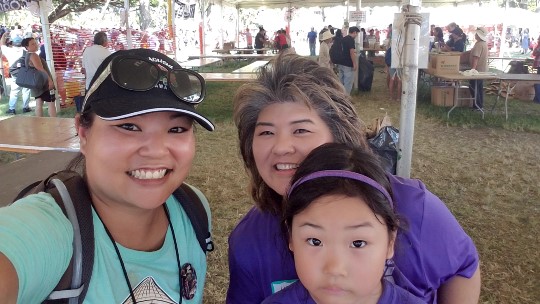
(L-R: Takara, Lyn Uesato, Heiwa Dori Booth Captain and daughter Leia Uesato) Heiwa Dori sold out of everything at the 2017 Okinawan Festival.
A love for Hawaii
Okinawa is special place to visit that’s different from Japan, similar to the way Hawaii is different from the Mainland. “It’s beautiful and the people are so warm and friendly,” Takara says. “And they absolutely love everyone, especially anyone from Hawaii. This is partially due to the long-standing sense of appreciation from the post-WWII recovery efforts that came from Hawaii.”
And if you can’t make it to Okinawa, you can still experience much of the culture right here in Hawaii. “Visit the Okinawan Festival and other HUOA events to get your Okinawa fix,” Takara says. “And if you're looking for Okinawan dishes at local restaurants, we’ve compiled a list!”
A celebration for all
Though the Okinawan Festival celebrates all things Okinawa, it’s an event for anyone who likes to talk story, eat delicious food, and enjoy performing arts.
“One of the highlights everyone looks forward to is the food,” Takara says. “Yes, we’ll have andagi and andadog, but there’s so much more!” She recommends Okinawan specialties like pig’s feet soup and Okinawa soba. “And stop by the Country Store for packaged treats from local small businesses, many of which are Uchinanchu-owned,” she says. “You can buy imported goods directly from Okinawa at the Heiwa Dori so you can make Uchinanchu dishes at home.”
The festival will also have entertainment, including local geinou (performing arts) groups and performers from Okinawa. “It’s been a few years since we've had guests and visitors from Okinawa join us due to the pandemic, so we're very excited,” Takara says. “We also have a couple of surprises, so be sure to check our website for the latest information.”
Sharing the love
Takara recently visited HMSA to give a presentation about Okinwan culture. She and HMSA employees Jen Gibo (also Takara's cousin) and Naomi Oshiro also give a bon dance demonstration!
